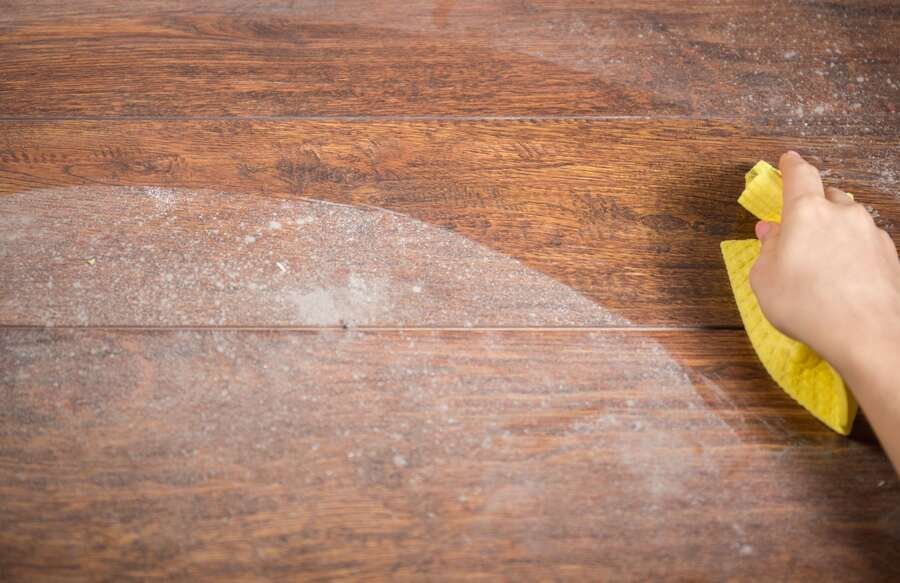Imagine that you have just spent hours dusting every surface in your room and making it look perfect. But after a few days, you notice dust beginning to accumulate on your shelves, furniture, and floors. That is annoying, right? If you have ever questioned Why Does My Room Get So Dusty? you’re not alone.
Understanding the main causes are: Why does my room get so dusty? Will help you to prevent the buildup of the dust and keep your space tidy for longer.
In this article we will examine the causes of the room getting dusty with proper reason and explanations and offer proper tips on how to keep your bedroom dust free to maintain a fresher living environment.
5 Reasons Behind Your Bedroom Get So Dusty
1. Air Conditioning
Your home’s HVAC unit pulls in air from outside, passing it through a filter. Then, it heats or cools the air and sends it through air ducts in your home.
If your filter is cheap or dirty, dust and dirt will continue to enter your home. When it’s dirty, your HVAC system works harder.
Not all air filters are the same for reducing dust. Basic fiberglass filters only do a little to keep dust out. There are washable and reusable filters, as well as disposable ones. To know your HVAC system’s filter type, check the current one. Seek advice from an HVAC professional or manufacturer to explore your options.
2. Humidity
Humidity matters a lot for dust mites at home. In places with low humidity, mites can’t survive. But dust can still be an issue even if your home is dry.
Both too little and too much humidity affect your dusty house. Basically dry air can mean more dust. Yet, if it’s too wet it helps mites and mold grow. For dry air, use a humidifier to reach comfort. Use the humidifier less, especially in drier winter.
The right humidity changes with the seasons. Summers are moist; winters are drier. Aim for indoor humidity between 40% and 60%. Some say 60% could grow mold. So, 50% is usually safer.
3. Furniture and Curtains

Dust gathers on the fabric. Even just moving curtains or sitting on a sofa can set it free. Vacuum attachments are handy for cleaning curtains and furniture weekly. And getting drapes professionally dry cleaned each year can cut dust.
If you use blinds or shades instead of curtains, wipe them often—no need for fancy tools; basic stuff at home works. With things you already have, you can easily clean your blinds.
4. Pets
Having pets at home might raise room dust. Generally pets shed fur, spread dust and dirt, and their dander turns to dust.
As pets move, they release dust on them and in the area. This dust spreads and builds up in the room on surfaces and corners.
5. Skin cells
Every day, we shed skin cells, especially while we sleep. These cells pile up and become the dust that spreads across your room.
Dry skin or restless sleep can make you shed more skin cells than usual. More shedding means more dust in your room.
How Do I Keep My Room Dust Free?
Dust might look harmless, but it holds risky stuff. Apart from dirt, it has tiny dangerous bits like mold, pollen, dander, and more. Here’s a list of simple, low-cost methods to do it and clean.
Vacuum Regularly
Vacuuming each week helps your air indoors a lot. If you dislike vacuuming, remove the carpets. Moreover choose fabric-free furniture like leather or wood.
In terms of Dusting or Vacuuming, It is your choice. Some pros say dust first, then vacuum with a HEPA filter. However this catches all the dust that drops on the floor while dusting.
Others say vacuum first. Vacuuming can stir dust, especially without a HEPA filter.
Use an Air Purifier
If dust is a bother and changes don’t help, air purifiers in different rooms might work. Still, even after cleaning, allergies like itchy eyes can stay.
Air purifiers use filters to remove more bad stuff from indoor air. If you link them with your heating or cooling, your HVAC works less. Overall remember to check the cleaner’s filter if you use one.
Use a Higher MERV Rating Filter in Your HVAC
A filter with a higher MERV rating stops more particles from entering your indoor air. If anyone at home has allergies or health issues, go for MERV 11 or 13. However these are best for homes.
Check filters each month. Thicker ones last more before changing. If they are super dusty, change them. Get charcoal filters to fight smells.
Look at the door and window strips. Change anything old or broken.
Change the Way You Dust
When you use a dry cloth, you move dust around. A damp microfiber cloth is better. If you lack microfiber, choose a damp cloth you can wash later. Moisture traps dust. Start from up high and go down. This stops top dust from falling on lower cleaned spots.
Clean fan blades. Dust sticks to vertical surfaces. Overall monthly, clean walls for dust. Also, do baseboards and ceilings at times using attachments.
Keep Your Shoes Out of the Bedroom
Imagine all the places your shoes touched. You walked outdoors, in stores, offices, and dusty trails.
Wherever your shoes go, they carry dust and dirt inside. Use a shoe rack or bin at the door to prevent dirt from spreading in your home. Meanwhile don’t store shoes in your bedroom closet.
Move Pets to Another Room (or Wash Their Beds Regularly)
Pets add to dust. To cut it in your bedroom, don’t let pets sleep there. But no judgment if you can’t say no to those big, puppy-dog eyes. If your furry friends sleep in your bedroom, carefully wash your bedding and their pet beds and soft toys every week.
Keep Your Floors Clean
Leaving clothes, pet toys, or stuff on the bedroom floor lets the dust settle in. Use a laundry bin for clothes and containers for toys. Clean floors well to stop dust buildup.
Vacuum rugs or carpets twice a week. Shake rugs once a month for tough dust. For hardwood floors, damp-mop daily to get rid of dust.
FAQs
What Causes Excessive Dust in a Room?
Excessive dust in a room happens due to various reasons. First, outdoor dirt comes in when we walk inside. Pets shed fur and dander, which turns to dust. Meanwhile dust gathers on surfaces. When we move, dust becomes airborne. All these factors together build up excessive dust in a room.
How Often Should You Be Dusting?
Dusting should be done regularly to keep things clean. Aim for at least once a week to prevent dust from settling. If you have pets or allergies or live in a dusty area, you should dust more often. Remember, the more you dust, the less dust will build up. It is all about keeping your space fresh and tidy.
How Much Dust is Normal?
A little dust is common in most places. Every year, a typical American home gathers around 40 pounds of dust. This is normal and not a concern. However, if this dust holds particles between 2.5 and 10 micrometers in size, it could cause breathing issues. But too much dust can cause allergies and make your space look messy. If you notice a thick layer of dust quickly after cleaning, consider checking for factors like pets, open windows, or other sources that could be making extra dust.
Do Air Purifiers Get Rid of Dust?
Yes, air purifiers help with dust. They have filters that catch dust particles as air passes through. These filters trap the dust, making the air cleaner. However, they work best alongside regular cleaning. While air purifiers can reduce dust, they might not eliminate it. So, while they can help, it’s still good to clean your space to manage dust effectively.
Can Dusty Air Make You Sick?
Yes, dusty air can make you sick. Dust carries tiny particles like germs, allergens, and mold spores. Breathing these in can lead to allergies, coughing, or even worsening asthma. Dusty air might also irritate your nose, throat, and eyes.
What Cleaner Repels Dust?
Certain cleaners like furniture polishes or sprays that contain anti-static ingredients can prevent dust from settling quickly. These cleaners create a barrier on surfaces, making it harder for dust to cling. However, remember that no cleaner can completely stop dust forever.
Conclusion
Have you ever wondered Why Does My Room Get So Dusty? In this article, we have discussed the main reasons for your dusty rooms and how to keep your room dust free. Using them you can now take action to fight dirt, grime and prevent their accumulations. Air purifier is an excellent choice for this time. It can remove airborne dust from your room.
After reading this article you can stop worrying about Why Does My Room Get So Dusty? By following these suggestions. Instead you can develop some healthy habits that improve the air quality of your home.
















